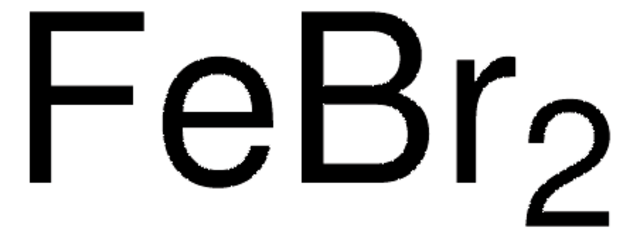450944
Iron(II) chloride
AnhydroBeads™, −10 mesh, 99.9% trace metals basis
Synonym(s):
Ferrous chloride, Iron dichloride
About This Item
Recommended Products
product line
AnhydroBeads™
Quality Level
assay
99.9% trace metals basis
reaction suitability
reagent type: catalyst
core: iron
impurities
≤1500.0 ppm Trace Metal Analysis
particle size
−10 mesh
mp
677 °C (lit.)
density
3.16 g/mL at 25 °C (lit.)
application(s)
battery manufacturing
SMILES string
Cl[Fe]Cl
InChI
1S/2ClH.Fe/h2*1H;/q;;+2/p-2
InChI key
NMCUIPGRVMDVDB-UHFFFAOYSA-L
Looking for similar products? Visit Product Comparison Guide
Application
Legal Information
accessory
signalword
Danger
hcodes
Hazard Classifications
Acute Tox. 4 Oral - Eye Dam. 1
Storage Class
8B - Non-combustible corrosive hazardous materials
wgk_germany
WGK 1
flash_point_f
does not flash
flash_point_c
does not flash
ppe
Eyeshields, Faceshields, Gloves, type P3 (EN 143) respirator cartridges
Choose from one of the most recent versions:
Already Own This Product?
Find documentation for the products that you have recently purchased in the Document Library.
Customers Also Viewed
Articles
Lithium-ion batteries represent a group of electrochemical devices used for electricity storage and have attracted a lot of attention in the past two decades due to their portability, rechargeability and low cost.
Plasmonic nanoparticles have unique optical properties that can be tailored to suit a variety of applications in the biotechnology1–8 and electronics9–16 industries.
Our team of scientists has experience in all areas of research including Life Science, Material Science, Chemical Synthesis, Chromatography, Analytical and many others.
Contact Technical Service












